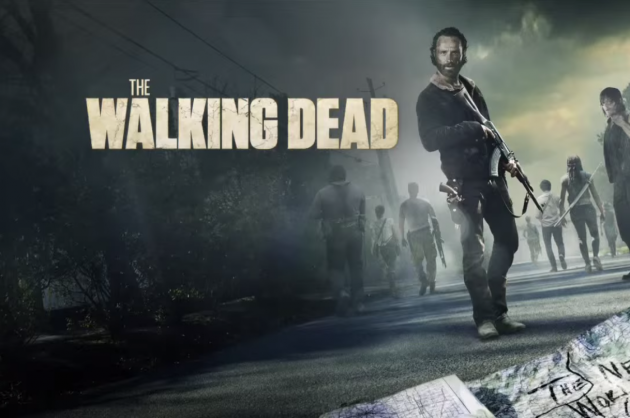SPOILER ALERT: Do not read on unless you are up to date with The Walking Dead Season 7…
The long summer of waiting is now over, and fans of AMC’s The Walking Dead now know the victim of new villain Negan’s wired-covered baseball bat, Lucille. In a violent, and controversial opening episode, Season 7 greeted viewers with the murders of Abraham, and present-from-the-very-beginning Glenn, who narrowly escaped death in Season 6. Andrew Lincoln, who plays main character Rick Grimes, has described the first half of the season as being ‘more Lord of the Rings than Lord of the Flies‘.
The Walking Dead features a number of similarities to Golding’s 1954 novel. Both are dystopian stories, taking place after hugely significant, and world-changing events. The Walking Dead is, for the most part, a typical zombie apocalypse narrative, although the word ‘zombie’ is never used; the infected humans are variously referred to as ‘walkers’ (by the main group), ‘biters’ (by The Governor in Seasons 3 and 4), and ‘roamers’ (by the people of Alexandria). It has not yet been revealed what caused the infection – a visit to the CDC in the opening season failed to answer any of the questions, and it seems that the quest for truth has been abandoned due to more pressing needs. Lord of the Flies takes place after an unspecified nuclear event, and the boys are being evacuated to safety when their place crashes. Golding’s original manuscript included opening chapters that detailed the nuclear war, but these were deleted in the next draft, evoking a sense of mystery in the world. Both the novel and the TV series feature a group of people trying to survive, and to rebuild a sense of community.
Society and leadership
‘People want someone to follow, to make them feel safe.’ Ezekiel (S7, E2)
Rick is in hospital when the infection begins, and thanks to best friend and police partner, Shane, is left in relative safety in a coma. He wakes up into a zombie-filled nightmare and discovers his wife, Lori, and son, Carl, have abandoned their home. Following a chance meeting with a group of survivors in Atlanta, Rick is reunited with his family, and immediately assumes a primary role within the group. Shane is the main antagonist in the early seasons of the programme, and consistently challenges Rick for leadership. Shane and Rick’s conflict stems from Shane’s affair with Lori, and Shane’s dismissive attitude towards Rick’s leadership skills. Rick is the epitome of the ‘good guy’; he attempts to instil a democratic society within the group, whereas Shane prefers to act immediately, without consultation. This situation comes to a head when Shane attempts to kill Rick.
This is mirrored in the relationship between Ralph and Jack in Lord of the Flies. Despite an initial leadership battle, they begin as friends, with Golding emphasising their ‘shy liking’ in the opening of the novel. However, Ralph’s insistence on the rules, and Jack’s obsession with killing and savagery, tear the boys apart, leading to a fractured society. Unlike The Walking Dead, the ‘bad guy’ wins in Lord of the Flies as Ralph loses his friends, and very nearly his life. Shane does cause disruption to the cohesion of the main group, but as adults, the survivors are able to differentiate between Rick’s genuine concern for stability, and Shane’s desire for chaos and revenge. The boys in Golding’s novel, however, are not sophisticated enough to understand.
War
‘I’m gonna kill people.’ Carol (S5, E1)
After Shane’s demise, the group settle into survival mode, with Rick still very much the leader, alternating between an autocracy and democracy. Rick remains the acknowledged leader throughout the series, even assuming a leadership role when the survivors arrive at Alexandria. However, despite the peace within the group, war inevitably comes through various other communities. The first such threat is from The Governor of Woodbury, who seeks to destroy Rick’s survivors through a need for revenge, and to take the prison in which they are living. A number of key characters are murdered during this war before The Governor finds himself on the wrong end of Michonne’s sword.
The prison is destroyed in this battle and the scattered people head to Terminus, which promises ‘sanctuary for all’. No such sanctuary exists, and the group that live here are cannibals, looking for fresh meat. In my favourite moment from The Walking Dead, the previously exiled Carol destroys Terminus and its inhabitants to save her friends. The most recent threat and declaration of war comes from Negan’s Saviors – a war that Rick initially thinks he has won until he discovers that his group are massively outnumbered.
Time and time again, our ‘civilised’ group is threatened by the far more savage armies of The Governor, the Terminus cannibals, and Negan’s Saviors. Although Rick and others have murdered and imprisoned enemies, they have done so in response to threats, rather than for a desire to kill and dominate. Just like in Lord of the Flies, war in The Walking Dead marks the battle between civilisation and savagery.
The ‘Beast’
‘People are the real threat now.’ Rick (S5, E13)
The beast in Lord of the Flies is an abstract, and mostly unseen threat and is referred to variously as a ‘snake-like thing’, a ‘ghost’, and Percival claims it comes from the sea (as an aside, in prequel Fear the Walking Dead, walkers can swim…). Simon tentatively says that ‘maybe it’s only us’ and here he accurately summarises that the beast exists within the boys, in the evil that humans can do to others. There is no need for a mythical beast to terrorise them, as they will end up terrorising each other.
This has striking similarities in The Walking Dead. Ostensibly, the enemy is the infected humans who seek to feed on the flesh of the survivors, and it’s true that in the first couple of seasons, the walkers did present the main threat. However, in the wars detailed above, the walkers are often an incidental occurrence, sometimes utilised as weapons, or as a disguise. The zombies are far easier to deal with than the terror inflicted by other humans. The fact that the infected are called different names by different groups seem to symbolise their lack of importance and significance, and to emphasise that the ‘beast’ is in humanity.
The human condition
‘The world we know is gone, but keeping our humanity? That’s a choice.’ Dale (S2, E11)
In both Lord of the Flies and The Walking Dead, characters struggle to hold onto what it means to be human. Both demonstrate that there is a fine line between civilisation and savagery, good and evil, and survival and domination. At this stage of The Walking Dead, evil, savagery and domination, represented by the Saviors, seems to be winning. As Andrew Lincoln stated, the first part of Season 7 does seem to be more like Lord of the Rings in that the characters have been separated in a number of different groups, all under the oppression of Negan. However, Rick and his group decide to fight to win back their civilisation, and perhaps the rest of the season will be more like Lord of the Flies. Viewers can only hope they are more successful than Ralph and Piggy.


